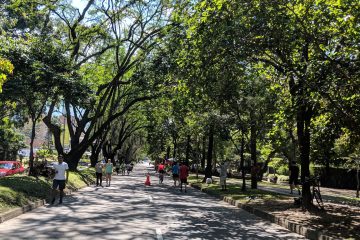The Im/Possibility of Global Solidarity

Recently I found myself part of a conversation about the question: “Can Human Solidarity Globalize?” At first, political philosopher Richard Falk’s question sounds straightforward. But as one attempts to frame an answer, it takes on the hint of a Zen koan. An answer of “yes” is barraged by its “but…but…but” so quickly as to empty into impossibility—which leaves us no better off than a blunt “no.” But politics, with wide impact on people’s lives, can’t settle for “no.” As Falk writes, politics is “the art of the impossible,” and the purpose of this art is to liberate the possible.
I would start here: inasmuch as human solidarity does not globalize, it fails to exist. A solidarity of the human is by definition global, for this species has long been spread around the globe. Human solidarity—not divisible into colored fragments denoting countries on a world map or into solidifications of one human collective over against another—is necessarily planetwide. And that is the case even before we take on the ecological meaning of globe as planet. If there is to be human solidarity, the solidarity of a species across its differences, it would be global solidarity. Which hardly exists. Nor therefore does human solidarity.
So in order to globalize, we face the possible impossibility of the challenge that now confronts us: the challenge to take responsibility for our failure of solidarity not just with each other but with all other planetary species. And to acknowledge that the planet can no longer abide this failure. “Code Red for Humanity,” announces the latest United Nations IPCC report. So the urgency of the contemporary global crisis of climate and therefore of the human itself does mount toward the impossible.
Not accidentally, this epoch comes philosophically framed as “the impossible possibility of the im/possible” (Jacques Derrida). That slash means to break through the paralysis of merely unrealizable possibilities and merely hopeless impossibilities. Might it crack the impossible open and point the way to “The Great Transition”? That is the name of a blog focused on the unprecedented levels of change and cooperation now required for a livable human future. It featured the recent month-long conversation with Falk on the possibility of a global solidarity.
Note, though, how even the language needed to express such a “great transition” struggles to capture the requisite global solidarity. The notion of the global must constantly be distinguished from neoliberalism, the globalism that drives the individualism of capitalism. At the same time, a progressive, planet-embracing globality must be distinguished from modern universalisms that unify an empowered “we” against some not-quite-human race, gender, or nationality, or that homogenize human differences.
We struggle for language that makes clear that the needed globality is pitted against individualism, not individuality, that solidarity thrives on the diversity not just of groups but of persons, and that globalization of solidarity, far from reducing difference, vastly enhances it.
For difference itself is relation: we exist only in and through the interrelations of our differences. And we thrive only in recognizing and strengthening our entangled differences. And then—without fear of our humanity being reduced—we can embrace our entanglement with the multiple layers of the nonhuman world.
In the interest of an ecosocial sustainability, Falk argues for a “responsible anthropocentrism.” Yet here also language, if we get it wrong, can weaken solidarity. I, like most ecotheologians, argue that anthropocentrism is at the root of our irresponsibility—right back through the history of misreadings of human “dominion” (Genesis 1:28). So I think any appeal to a human-centered universe will backfire ecologically. Yet reading Falk, I certainly can imagine the strategic value of appeal to an anthropos in whose center all the layers of our evolution and all the tangles/connections with our material ecology meet.
The point is that at the heart of our–human–reality, self-knowledge demands global responsibility. The responsible anthropos then becomes a portal into solidarity and to a “great transition” that may for the foreseeable future seem still impossible.
I wrote The Cloud of the Impossible: Negative Theology and Planetary Entanglement (Columbia, 2015) in recognition of how the density of the challenges we face occlude a vision whereby we might address them. The title is a citation of the fifteenth century polymath Nicolas of Cusa, who is speaking precisely of vision. “And the more that cloud of impossibility is recognized as obscure and impossible, the more truly the necessity shines forth and the less veiled it appears and draws near” (On Learned Ignorance, 1440, in The Cloud of the Impossible, 99].
Cusa’s cloud floats directly from the ancient tradition of negative theology and its “luminous darkness.” There glow in the darkness of the cloud im/possibilities opened by that very “necessity.” Cusa does not mean the necessity of divine control or intervention. Rather, he means the deepest truth of our shared creaturely cosmos. As that truth remains “obscure” and “impossible,” it renders literal notions of divine revelation and causation too simplistic: if they were literally true, they would not be obscure. Might Cusa’s necessary truth today be the necessity of enough of us across the world bonding in great enough solidarity to make the needed difference? Might our mindfulness of the glowing darkness not shed its unwhite light on the necessities we face? Even now, as burning forests cast clouds across the landscape thousands of miles away from the blaze?
Cusa’s “cloud of the impossible” (and therefore mine) is of theological origin. Given the way that religious exclusivisms and supernaturalisms feed the politics of international right wings, can theology also help to strengthen the solidarities against those right wings and towards a political “art of the impossible”? A few political thinkers do gesture toward religion or spirituality in quest for a language and practice of solidarity. Falk encourages a sense of “cosmic awe” that moves between, through, and beyond any particular religion. For as he says, “gestating within the cultural bosom of world civilizations and world religions have been subversive ideas of global solidarity.”
As one of many examples, The Parliament of World Religions earlier this summer sent out word of a new virtual application of their 1993 “Declaration Toward a Global Ethic.” The Parliament, which over the years has been opened by the Dalai Lama, Nelson Mandela and UN Messenger of Peace Jane Goodall, advocates across the world religions for social, political, and ecological justice. The Parliament will this year use its new virtual platform to explore and enact the activist potential of its pluralist and planetary commitments.
In other examples of religion’s potential role: even secular thinkers and activists have some familiarity with Pope Francis’s Laudato Si, the encyclical responding to “the cry of the poor, the cry of the earth.” The decades of efforts by liberation theologians in Latin American and by U.S. Black, Asian, feminist, womanist, and ecological theologies have had insufficient but immense impact. They work in deep solidarity with secular movements. The current work of the Institute for Ecological Civilization, based in Los Angeles and working internationally (with, for example, remarkable influence in China) grows out of process theology, based on the relational cosmology of mathematician Alfred North Whitehead.
Such global movements—broadly ecumenical, social, and ecological—inhabit a universality of the universe, a cosmopolitanism of the cosmos. Its universals of solidarity do not work to homogenize the human. Its cosmic breadth honors the interrelated diversities of all creatures.
Religious institutions are thereby mobilized by those who work not against religion itself but against the conservative narrowings and right-wing deployments of religion. The U.S. Christian right has been particularly galvanized, and dangerously politicized, by its reading of the biblical prophecy of apocalypse. It fosters an aggressive, use-it-up indifference to the materialities of “this world.” But the secular left be paralyzed by its own End-of-the-World scenario. For the portal of possibility to global solidarity really may soon slam shut.
But if it has not yet closed, to ignore present possibilities is to betray them. In the interest of these barely possible possibilities, I recently wrote Facing Apocalypse: Climate, Democracy and Other Last Chances (Orbis, 2021). It deploys the ancient imaginary of apocalypse against contemporary cultures of both climate change denialism and defeatist, fatalistic nihilism (it’s happening; there is nothing we can do….). The surreal metaphors of the biblical Apocalypse rage against global imperialism and global economics, promising against all odds the eco-urban utopia of the New Jerusalem. The word apokalypsis, after all, means not “end of the world” but “unveiling.” Dis/closure, not closure: eye-opening. Dis-closure, seeing Cusa’s “necessary” truths about the planet at present is what enables the possibility of addressing them.
The crisis itself presses possibility out of impossibility. The possibility of a Great Transition? A chance, perhaps, but nothing like a guarantee. Falk—with no biblical inflection—renders the global opening thus: “Transition is not off in the distance or only in dreamscapes or science fiction imaginaries”—or, I add, in archaic apocalyptic visions. “It is happening around us if we only learn to open our eyes and hearts to the possibilities now emerging.”
May I say “amen”?
#
Catherine Keller is George T. Cobb Professor of Constructive Theology in The Graduate Division of Religion of Drew University. She teaches and lectures across a broad spectrum of pluralist, ecofeminist, process, and political theology. Her most recent book is Facing Apocalypse: Climate, Democracy and Other Last Chances. Other books include: Apocalypse Now & Then: a Feminist Approach to the End of the World; Face of the Deep: a Theology of Becoming; On the Mystery; Cloud of the Impossible: Negative Theology and Planetary Entanglement; and Political Theology of the Earth: Our Planetary Emergency and the Struggle for a New Public. She has co-edited several volumes of the Drew Transdisciplinary Theological Colloquium, most recently Entangled Worlds: Religion, Science and the New Materialism
Counterpoint blogs may be reprinted with the following acknowledgement: “This article was published by Counterpoint Navigating Knowledge on 8 September 2021.”
The views and opinions expressed on this website, in its publications, and in comments made in response to the site and publications are those of the author(s) and do not necessarily reflect the views and opinions of Counterpoint: Navigating Knowledge, its founders, its staff, or any agent or institution affiliated with it, nor those of the institution(s) with which the author is affiliated. Counterpoint exists to promote vigorous debate within and across knowledge systems and therefore publishes a wide variety of views and opinions in the interests of open conversation and dialogue.
Photo Credit: Celine Martin
An earlier version of this blog appeared in “Can Human Solidarity Globalize?,” Great Transition Initiative, https://greattransition.org/gti-forum/global-solidarity-keller.


